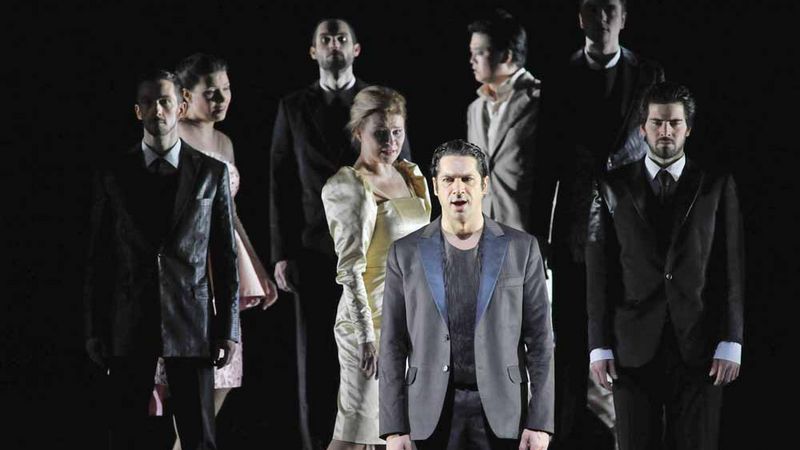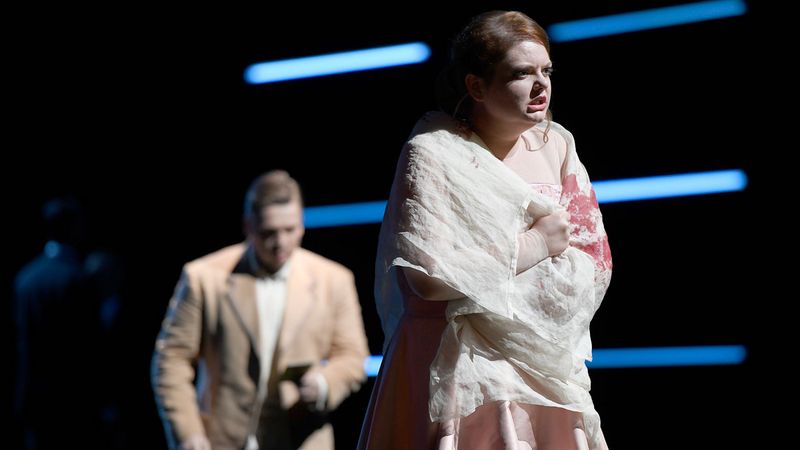Don Giovanni
Sat, 29. June 2024, 19:00
Wolfgang Amadeus Mozart (1756 – 1791)
In Mozart's dramma giocoso DON GIOVANNI, a character is up to mischief who seems familiar to us, whom we think we know, and yet who says of himself: "Who I am, you will never know." Director Roland Schwab purposefully made his way through the material, which is overloaded with interpretations, searching for his very own approach, finding the demonic Don Giovanni, one through whose eyes one can plunge into deep black holes one moment, only to succumb to his wit the next ... Conductor: Daniel Cohen; Director: Roland Schwab; With Davide Luciano, Flurina Stucki, Matthew Newlin, Patrick Guetti, Maria Motolygina, Joel Allison, Artur Garbas, Lilit Davtyan a. o.
About the workIn their second collaboration after LE NOZZE DI FIGARO Wolfgang Amadeus Mozart and Lorenzo da Ponte drew on the Spanish legend of Don Juan. Earlier popularity aside, the protagonist only attained the mythical dimensions of a heroic archetype in Mozart’s operatic version, which went on to inspire countless reimaginings of the material and philosophical readings by E. T. A. Hoffmann, Søren Kierkegaard et al. A raft of musical pieces from DON GIOVANNI, ranging from arias and the famous overture to duets, trios and ensembles, have seared themselves into our collective awareness.
The opera takes up the story when Don Giovanni’s career as womanizer is already far advanced: his valet, Leporello, puts the number of conquests in Spain alone at 1,003. Yet the Don’s compulsion shows no sign of abating, even though – or because - there is risk in each added attempt. Caught in flagranti with Donna Anna, he kills her father in a duel and flees, pursued by Anna, her fiancé Don Ottavio and his ex-lover Donna Elvira. The next object of his lust is Zerlina, whom he hopes to ravish under the nose of her prospective husband, Masetto, on their wedding day. The peripatetic rake repeatedly provokes the people around him and his own fate, as if wishing to hasten the inevitable.
About the productionMozart fuses sobering and light-hearted elements and comedy with tragedy in a “Dramma giocoso” that E. T. A. Hoffmann called the “opera to end all operas”. And Don Giovanni is unquestionably the seducer par excellence. Since Tirso de Molina penned his original 17th-century play, countless works of literature and theatre have devoted themselves to his amorous escapades. But who really is Don Juan? Director Roland Schwab sets out to find the Don Giovanni of modern-day Berlin. What can still raise a pulse, with every woman already a notch on the bedpost and every evening partied away? Is it the orgies that line up ahead of the burnt-out libertine that possibly represent the real Hell?
The production takes an existentialist approach, analysing the emotional state of the eponymous hero and painting him as ravaged by his decadent lifestyle. Aided and abetted by Leporello, his valet, who relishes his boss’s perfidy, Don Giovanni submits to the temptations around him – deploying a superior sex appeal, a detached, domineering style or frenzied violence. As the hellish excesses take on a Sisyphean quality, the obsessed antihero resorts to meditation as a coping mechanism, condemned to rage forever against the abstract backdrop of set designer Piero Vinciguerra.
Werkinfo:
Dramma giocoso in two actsLibretto by Lorenzo da Ponte; First performed on 29th October, 1787 at PraguePremiered at the Deutsche Oper Berlin on 16th October, 2010
Recommended from 16 years on



